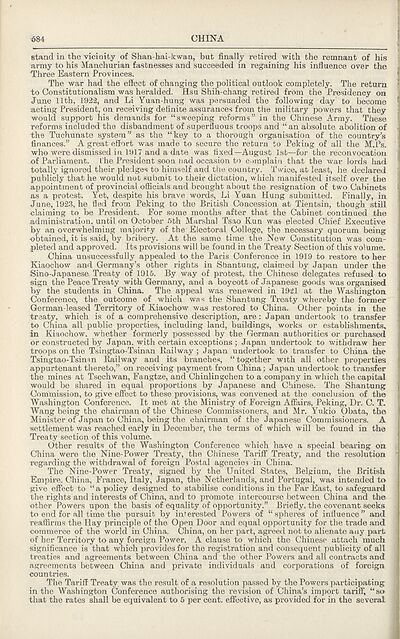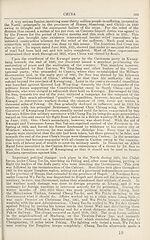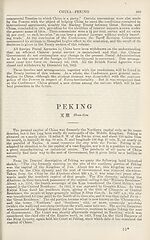1924
(650) Page 584
Download files
Complete book:
Individual page:
Thumbnail gallery: Grid view | List view

o84
CHINA
stand in the vicinity of Shan-hai-kwan, but finally retired with the remnant of his
army to his Manchurian fastnesses and succeeded in regaining his influence over the
Three Eastern Provinces.
The war had the effect of changing the political outlook completely. The return
to Constitutionalism was heralded. Hsu Shih-chang retired from the Presidency on
June 11th. 1922, and Li Yuan-hung was persuaded the following day to become
acting President, on receiving definite assurances from the military powers that they
would support his demands for “sweeping reforms” in the Chinese Army. These
reforms included the disbandment of superfluous troops and “an absolute abolition of
the Tuchunate system” as the “key to a thorough organisation of the country’s
finances.” A great effort was made to secure the return to Peking of all the M.Ps.
who were dismissed in 1917 and a date was fixed—August 1st—for the reconvocation
of Parliament. 1'he President soon had occasion to complain that the war lords had
totally ignored their pledges to himself and the country. Twice, at least, he declared
publicly that he would not submit to their dictation, which manifested itself over the
appointment of provincial officials and brought about the resignation of two Cabinets
as a protest. Yet, despite his brave words, Li Yuan Hung submitted. Finally, in
June, 1923, he fled from Peking to the British Concession at Tientsin, though still
•claiming to be President. For some months after that the Cabinet continued the
administration, until on October 5th Marshal Tsao Kun was elected Chief Executive
by an overwhelming majority of the Electoral College, the necessary quorum being
■obtained, it is said, by bribery. At the same time the New Constitution was com¬
pleted and approved. Its provisions wil I be found in the Treaty Section of this volume.
China unsuccessfully appealed to the Paris Conference in 1919 to restore to her
Kiaochow and Germany’s other rights in Shantung, claimed by Japan under the
Sino-Japanese Treaty of 1915. By way of protest, the Chinese delegates refused to
sign the Peace Treaty with Germany, and a boycott of Japanese goods was organised
by the students in China. The appeal was renewed in 1921 at the Washington
Conference, the outcome of which was the Shantung Treaty whereby the former
German-leased Territory of Kiaochow was restored to China. Other points in the
treaty, which is of a comprehensive description, are: Japan undertook to transfer
to China all public properties, including land, buildings, works or establishments,
in Kiaochow. whether formerly possessed by the German authorities or purchased
or constructed by Japan, with certain exceptions ; Japan undertook to withdraw her
troops on the Tsingtao-Tsinan Railway; Japan undertook to transfer to China the
Tsingtao-Tsinan Railway and its branches, “together with all other properties
appurtenant thereto,” on receiving payment from China; Japan undertook to transfer
the mines at Tsechwan, Eangtze, and Chinlingchen to a company in which the capital
would be shared in equal proportions by Japanese and Chinese. The Shantung
Commission, to give effect to these provisions, was convened at the conclusion of the
Washington Conference. It met at the Ministry of Foreign Affairs, Peking, Dr. C. T.
Wang being the chairman of the Chinese Commissioners, and Mr. Yukio Obata, the
Minister of Japan to China, being the chairman of the Japanese Commissioners. A
settlement was reached early in December, the terms of which will be found in the
Treaty section of this volume.
Other results of the Washington Conference which have a special bearing on
China were the Nine-Power Treaty, the Chinese Tariff Treaty, and the resolution
regarding the withdrawal of foreign Postal agencies in China.
The Nine-Power Treaty, signed by the United States, Belgium, the British
Empire, China, France, Italy, Japan, the Netherlands, and Portugal, was intended to
give effect to “ a policy designed to stabilise conditions in the Far East, to safeguard
the rights and interests of China, and to promote intercourse between China and the
other Powers upon the basis of equality of opportunity.” Briefly, the covenant seeks
to end for all time the pursuit by interested Powers of “ spheres of influence ” and
reaffirms the Hay principle of the Open Door and equal opportunity for the trade and
commerce of the world in China. China, on her part, agreed not to alienate any part
of her Territory to any foreign Power, A clause to which the Chinese attach much
significance is that which provides for the registration and consequent publicity of all
treaties and agreements between China and the other Powers and all contracts and
agreements between China and private individuals and corporations of foreign
countries.
The Tariff Treaty was the result of a resolution passed by the Powers participating
in the Washington Conference authorising the revision of China’s import tariff, “so
that the rates shall be equivalent to 5 per cent, effective, as provided for in the several
CHINA
stand in the vicinity of Shan-hai-kwan, but finally retired with the remnant of his
army to his Manchurian fastnesses and succeeded in regaining his influence over the
Three Eastern Provinces.
The war had the effect of changing the political outlook completely. The return
to Constitutionalism was heralded. Hsu Shih-chang retired from the Presidency on
June 11th. 1922, and Li Yuan-hung was persuaded the following day to become
acting President, on receiving definite assurances from the military powers that they
would support his demands for “sweeping reforms” in the Chinese Army. These
reforms included the disbandment of superfluous troops and “an absolute abolition of
the Tuchunate system” as the “key to a thorough organisation of the country’s
finances.” A great effort was made to secure the return to Peking of all the M.Ps.
who were dismissed in 1917 and a date was fixed—August 1st—for the reconvocation
of Parliament. 1'he President soon had occasion to complain that the war lords had
totally ignored their pledges to himself and the country. Twice, at least, he declared
publicly that he would not submit to their dictation, which manifested itself over the
appointment of provincial officials and brought about the resignation of two Cabinets
as a protest. Yet, despite his brave words, Li Yuan Hung submitted. Finally, in
June, 1923, he fled from Peking to the British Concession at Tientsin, though still
•claiming to be President. For some months after that the Cabinet continued the
administration, until on October 5th Marshal Tsao Kun was elected Chief Executive
by an overwhelming majority of the Electoral College, the necessary quorum being
■obtained, it is said, by bribery. At the same time the New Constitution was com¬
pleted and approved. Its provisions wil I be found in the Treaty Section of this volume.
China unsuccessfully appealed to the Paris Conference in 1919 to restore to her
Kiaochow and Germany’s other rights in Shantung, claimed by Japan under the
Sino-Japanese Treaty of 1915. By way of protest, the Chinese delegates refused to
sign the Peace Treaty with Germany, and a boycott of Japanese goods was organised
by the students in China. The appeal was renewed in 1921 at the Washington
Conference, the outcome of which was the Shantung Treaty whereby the former
German-leased Territory of Kiaochow was restored to China. Other points in the
treaty, which is of a comprehensive description, are: Japan undertook to transfer
to China all public properties, including land, buildings, works or establishments,
in Kiaochow. whether formerly possessed by the German authorities or purchased
or constructed by Japan, with certain exceptions ; Japan undertook to withdraw her
troops on the Tsingtao-Tsinan Railway; Japan undertook to transfer to China the
Tsingtao-Tsinan Railway and its branches, “together with all other properties
appurtenant thereto,” on receiving payment from China; Japan undertook to transfer
the mines at Tsechwan, Eangtze, and Chinlingchen to a company in which the capital
would be shared in equal proportions by Japanese and Chinese. The Shantung
Commission, to give effect to these provisions, was convened at the conclusion of the
Washington Conference. It met at the Ministry of Foreign Affairs, Peking, Dr. C. T.
Wang being the chairman of the Chinese Commissioners, and Mr. Yukio Obata, the
Minister of Japan to China, being the chairman of the Japanese Commissioners. A
settlement was reached early in December, the terms of which will be found in the
Treaty section of this volume.
Other results of the Washington Conference which have a special bearing on
China were the Nine-Power Treaty, the Chinese Tariff Treaty, and the resolution
regarding the withdrawal of foreign Postal agencies in China.
The Nine-Power Treaty, signed by the United States, Belgium, the British
Empire, China, France, Italy, Japan, the Netherlands, and Portugal, was intended to
give effect to “ a policy designed to stabilise conditions in the Far East, to safeguard
the rights and interests of China, and to promote intercourse between China and the
other Powers upon the basis of equality of opportunity.” Briefly, the covenant seeks
to end for all time the pursuit by interested Powers of “ spheres of influence ” and
reaffirms the Hay principle of the Open Door and equal opportunity for the trade and
commerce of the world in China. China, on her part, agreed not to alienate any part
of her Territory to any foreign Power, A clause to which the Chinese attach much
significance is that which provides for the registration and consequent publicity of all
treaties and agreements between China and the other Powers and all contracts and
agreements between China and private individuals and corporations of foreign
countries.
The Tariff Treaty was the result of a resolution passed by the Powers participating
in the Washington Conference authorising the revision of China’s import tariff, “so
that the rates shall be equivalent to 5 per cent, effective, as provided for in the several
Set display mode to:
![]() Universal Viewer |
Universal Viewer | ![]() Mirador |
Large image | Transcription
Mirador |
Large image | Transcription
Images and transcriptions on this page, including medium image downloads, may be used under the Creative Commons Attribution 4.0 International Licence unless otherwise stated. ![]()
| Asian directories and chronicles > 1924 > (650) Page 584 |
|---|
| Permanent URL | https://digital.nls.uk/196432333 |
|---|
| Attribution and copyright: |
|
|---|---|
| Description | Volumes from the Asian 'Directory and Chronicle' series covering 1917-1941, but missing 1919 and 1923. Compiled annually from a multiplicity of local sources and research. They provide listings of each country's active corporations, foreign residents and government agencies of all nationalities for that year, together with their addresses. Content includes: various treaties; coverage of conflicts; currencies and taxes; consular fees; weights and measures; public holidays; festivals and traditions. A source of information for both Western states and communities of foreigners living in Asia. Published by Hongkong Daily Press. |
|---|---|
| Shelfmark | H3.86.1303 |
| Additional NLS resources: |

